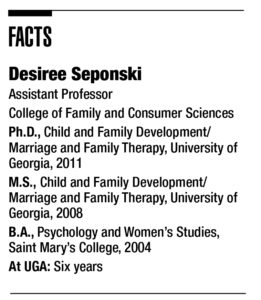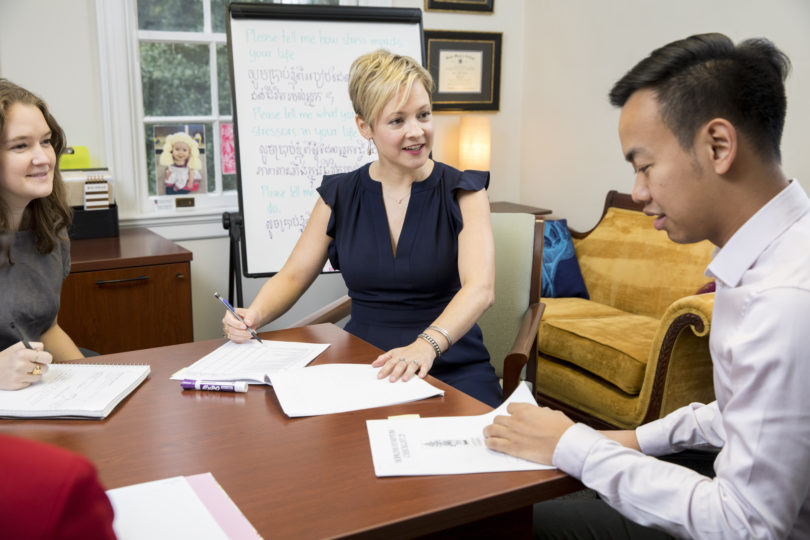(Originally published on Nov. 14, 2019)
Desiree Seponski hesitantly answered an ad for a nanny during her undergraduate years at Saint Mary’s College in Indiana.
It was a seemingly insignificant step that proved transformative.
 “The couple had a beautiful marriage, and I was blown away to see people with so much kindness in their family,” Seponski said. “I thought, ‘I want to help people be like that.’ ”
“The couple had a beautiful marriage, and I was blown away to see people with so much kindness in their family,” Seponski said. “I thought, ‘I want to help people be like that.’ ”
Growing up in an economically distressed, rural part of southern Indiana, Seponski said her time as a nanny not only broadened her idea of what healthy relationships look like, it established what would become a pattern in her life.
“I began saying yes to a lot of seemingly random opportunities,” she said.
An internship at Yale University would follow, and by the time Seponski landed in Athens for graduate work, her passion for improving access to mental health care and helping people strengthen their relationships had taken root.
Now an assistant professor in the College of Family and Consumer Sciences’ human development and family science department, Seponski conducts research that focuses on families who have experienced trauma and marginalization as well as culturally responsive family therapy.
The culture of poverty has a circular relationship with mental health issues, Seponski said, something she strives to address in her research.
“The biggest shock to my scholarship and even in my own personal life is the impact that poverty really does have and is intertwined with mental health,” Seponski said. “So often we think we can treat somebody for anxiety, depression, post-traumatic stress disorder, etc., but when you send them back into abject poverty where they have very little food or a safe place to sleep, therapy is going to help minimally, if at all.”
It’s a phenomenon Seponski has seen firsthand in her research in Cambodia, where she first ventured in 2008 as a graduate student on a study away tour that involved outreach to children orphaned by the HIV/AIDS epidemic.
Since then, she has made multiple trips to conduct research and outreach projects and has fallen in love with the people of the impoverished country in southeast Asia.
“The people are so resilient and kind,” she said. “It’s impossible to not see the poverty and corruption—it’s right in front of your face—but for me it was just amazing to see all the resilience and the continual desire to live life to the best of their ability.”
In addition to teaching courses on family therapy, Seponski serves as a clinical supervisor to doctoral students in the college’s marriage and family therapy program through the ASPIRE Clinic.
Here, students conduct therapy sessions with clients from the university and Athens community, gaining valuable real-world experience under trained and licensed practitioners like Seponski.
“I think it’s one of the campus’ biggest highlights,” Seponski said of the clinic, which offers free and reduced costs for a range of services including nutrition counseling, legal advice and financial planning.
Seponski, who previously served on the faculty of the University of Houston-Clear Lake, also co-directs a local refugee responsiveness team that gives students opportunities to engage directly with the refugee community through family wellness programs.
She also was recently voted president-elect of the International Family Therapy Association.
Through these avenues and others, Seponski said she’s energized by a desire to address systemic inequalities that make access to mental health services out of reach for so many people and for training the next generation of family therapy practitioners.
“Given everything that’s going on with our larger systems, whether it’s poverty or disagreements with political systems or structural discrimination, mental health issues are so treatable,” Seponski said. “If people had access and more people were trained in culturally responsive ways, what a difference that would make in our society.”








